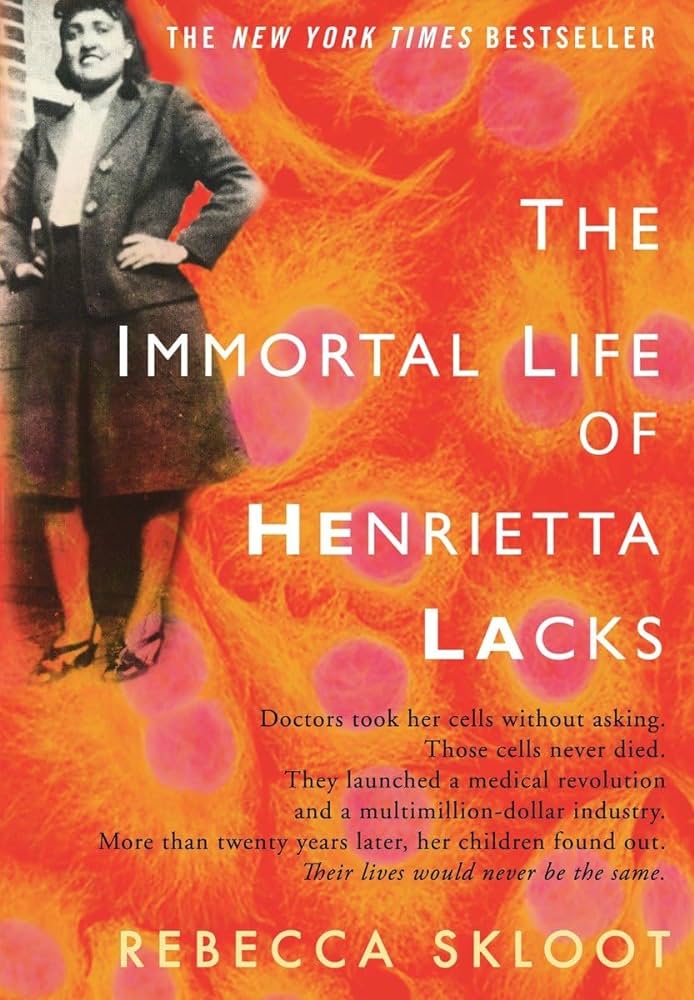“It was a story of white selling black, of black cultures “contaminating” white ones with a single cell in an era when a person with “one drop” of black blood had only recently gained the legal right to marry a white person. It was also the story of cells from an uncredited black woman becoming one of the most important tools in medicine.”

Title: The Immortal Life of Henrietta Lacks
Author: Rebecca Skloot
Rating: 5/5 Stars
Link to book: The Immortal Life of Henrietta Lacks
This was truly an eye-opener for me. “The Immortal Life of Henrietta Lacks” is a gripping exploration of science, ethics, and the human story behind one of the most influential cell lines in medical history. If you are not in the science or medical field like me, you probably wouldn’t have heard of HeLa cells. HeLa derives its name from Henrietta Lacks, a poor African American woman. The John Hopkins Hospital took her cells without consent during a medical procedure when she had terminal cervical cancer in 1951. Shortly after, she passed away at the young age of 31, leaving behind her five children and husband. Little did she know, these cells would become the first immortal human cell line, revolutionizing medical research and leading to countless scientific breakthroughs.
Skloot delves into the complexities surrounding Henrietta’s story, including issues of consent, racial inequality, and the commercialization of medical discoveries. She sensitively explores the personal toll Henrietta’s unwitting contribution took on her family. The Lacks family struggled to understand the significance of her cells and did not get any compensation for their invaluable contribution to science. The Lacks family were really robbed. It’s mad that they did not, and have not, received any compensation for their mum’s cells. But other companies are profiting off it. Would this have happened if Henrietta were a different social class or race?! I also need to commend Skloot for her perseverance and tenacity in writing this story. She faced so many setbacks and resistance from everyone, including the Lacks family. Still, she remained determined and did everything she could to gain their trust. She was so dedicated to giving Henrietta Lacks a voice.
My favourite part was when her daughters were finally invited to see their mother’s cells in the lab. It was the first time they came into contact with their mother’s legacy. It was something so important to the scientific community, yet something they been actively excluded from. And this was the first time they had seen the magnitude of it. Goosebumps!
“Deborah and Zakariyya stared at the screen like they’d gone into a trance, mouths open, cheeks sagging. It was the closest they’d come to seeing their mother alive since they were babies.”
This book is a thought-provoking exploration of the intersection between science and ethics. Skloot raises important questions about the responsibility of scientists to respect the rights of their subjects and the need for greater transparency in medical research. However, despite the weighty subject matter, Skloot’s writing is accessible and engaging. This book reads like a fiction story and is accessible to both scientific and non-scientific audiences alike. She strikes a delicate balance between scientific detail and human drama, creating a narrative that is as informative as it is emotionally resonant.
Overall, “The Immortal Life of Henrietta Lacks” is a poignant and thought-provoking book. It sheds light on an important but often overlooked chapter in the history of medicine. Skloot’s dedication to telling Henrietta’s story with sensitivity and respect makes this book a must-read for anyone interested in the intersection of science, ethics, and human rights.